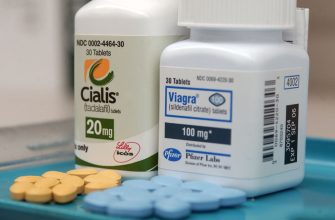Need help deciding between Viagra, Cialis, and Levitra? Focus on your lifestyle and preferences. Viagra provides fast-acting relief lasting 4-5 hours; perfect for spontaneous intimacy. Its onset is typically 30-60 minutes.
Cialis, conversely, offers longer-lasting effects (up to 36 hours), making it ideal for those who prefer more flexibility in scheduling. Consider its slightly slower onset time of 30-60 minutes. It may cause longer-lasting side effects for some users.
Levitra offers a middle ground. It’s effective for 4-5 hours, with an onset time similar to Viagra. It’s often preferred by men who have experienced side effects from other medications. Always consult your doctor before making a decision; they can guide you toward the best option based on your individual health history and needs.
- Viagra, Cialis, and Levitra: A Detailed Comparison
- Understanding Erectile Dysfunction and Treatment Options
- Viagra (Sildenafil): Mechanism of Action, Dosage, and Side Effects
- Cialis (Tadalafil): Long-lasting Effects, Dosage, and Potential Side Effects
- Dosage and Administration
- Potential Side Effects
- Important Considerations
- Levitra (Vardenafil): Rapid Onset, Dosage, and Side Effect Profile
- Choosing the Right Medication: Factors to Consider and Consulting a Doctor
- Understanding Your Specific Needs
- Considering Side Effects and Drug Interactions
- Exploring Treatment Options Beyond Medication
- Cost and Insurance Coverage
Viagra, Cialis, and Levitra: A Detailed Comparison
Choosing the right medication depends on your individual needs and preferences. Let’s examine the key differences.
- Onset of action: Viagra typically takes 30-60 minutes to work. Cialis boasts a much longer onset, often starting within 30 minutes but lasting up to 36 hours. Levitra’s onset is similar to Viagra, around 30-60 minutes.
- Duration of action: Viagra’s effects generally last 4-5 hours. Cialis, as mentioned, can last significantly longer, up to 36 hours. Levitra’s duration is comparable to Viagra, lasting around 4-5 hours.
- Dosage: All three medications come in various strengths. Your doctor will prescribe the appropriate dose based on your health and individual response. Adjustments may be needed.
- Side effects: Common side effects include headache, flushing, nasal congestion, and indigestion. These usually are mild and temporary. Rarely, more serious side effects can occur; consult your physician immediately if you experience anything unusual.
- Interactions: These medications can interact with other drugs, particularly nitrates. Be sure to inform your doctor about all medications you are taking. Grapefruit juice can also affect their effectiveness and should be avoided.
Here’s a table summarizing the key differences:
| Medication | Onset (minutes) | Duration (hours) |
|---|---|---|
| Viagra | 30-60 | 4-5 |
| Cialis | 30+ | 36 |
| Levitra | 30-60 | 4-5 |
Consider these factors when discussing treatment options with your doctor: your health history, other medications you’re taking, your desired duration of effect, and your tolerance for potential side effects. They can guide you toward the best choice for your specific circumstances.
Disclaimer: This information is for educational purposes only and does not constitute medical advice. Always consult with your doctor before starting any new medication.
Understanding Erectile Dysfunction and Treatment Options
Erectile dysfunction (ED) affects millions, and help is available. It’s characterized by the inability to achieve or maintain an erection firm enough for satisfactory sexual intercourse. Several factors contribute, including physical conditions like diabetes, heart disease, and nerve damage, as well as psychological factors such as stress and anxiety.
Treatment focuses on addressing the underlying cause. Lifestyle changes, such as regular exercise, a balanced diet, and smoking cessation, can significantly improve ED symptoms for many men. Weight management is also key, as obesity is a frequent contributor.
Medications like Viagra (sildenafil), Cialis (tadalafil), and Levitra (vardenafil) are common first-line treatments. These oral medications increase blood flow to the penis, facilitating erections. However, they are not suitable for everyone and may have side effects. Always consult a doctor before starting any medication.
| Medication | Onset of Action | Duration of Effect | Common Side Effects |
|---|---|---|---|
| Viagra | 30-60 minutes | 4-5 hours | Headache, flushing, nasal congestion |
| Cialis | 30 minutes | Up to 36 hours | Headache, back pain, muscle aches |
| Levitra | 25-60 minutes | 4-5 hours | Headache, flushing, nasal congestion |
Other treatment options include vacuum erection devices, penile injections, and surgery. Vacuum devices create a vacuum to draw blood into the penis, inducing an erection. Injections directly introduce medications to improve blood flow. Surgery is considered for severe cases or when other treatments have failed.
Seeking professional medical advice is crucial. A doctor can properly diagnose the cause of ED and recommend the most appropriate treatment plan. Open communication with your doctor is essential for effective management.
Viagra (Sildenafil): Mechanism of Action, Dosage, and Side Effects
Sildenafil works by increasing blood flow to the penis. This happens because it inhibits an enzyme called phosphodiesterase-5 (PDE5), allowing increased levels of cyclic GMP, which relaxes the muscles in blood vessels. This relaxation leads to improved blood flow, facilitating an erection.
The typical starting dose of Viagra is 50 mg taken orally, about one hour before sexual activity. Your doctor might adjust this based on your response and health status. Doses range from 25 mg to 100 mg, but never exceed the prescribed dose.
Common side effects include headache, flushing, nasal congestion, and visual disturbances. More serious, though rare, side effects include sudden vision loss or hearing loss, prolonged erection (priapism), and heart problems. Seek immediate medical attention if you experience any of these serious side effects.
Remember, Viagra is not suitable for everyone. Individuals with certain heart conditions, low blood pressure, or taking specific medications should discuss its use with their physician. Always follow your doctor’s instructions carefully and be honest about your health history.
Cialis (Tadalafil): Long-lasting Effects, Dosage, and Potential Side Effects
Cialis, containing tadalafil, offers a longer duration of action compared to Viagra or Levitra. Its effects can last up to 36 hours, allowing for more spontaneity.
Dosage and Administration
The typical starting dose is 10mg taken as needed, at least 30 minutes before sexual activity. Your doctor may adjust this based on your response and health conditions. Never exceed the recommended dosage. Cialis is available in 2.5mg, 5mg, 10mg, and 20mg tablets. A lower dose (5mg) is sometimes prescribed for daily use to maintain erectile function.
Potential Side Effects
Like all medications, Cialis can cause side effects, though not everyone experiences them. Common side effects include headache, flushing, nasal congestion, and indigestion. Less common, but more serious, side effects include vision changes (such as blurred vision or changes in color vision), hearing loss, and prolonged erection (priapism). Seek immediate medical attention if you experience a prolonged erection lasting more than four hours. Rarely, Cialis can interact with other medications, so inform your doctor about all medications you’re taking, including over-the-counter drugs and supplements.
Important Considerations
Cialis isn’t suitable for everyone. Men with certain heart conditions, low blood pressure, or severe liver or kidney problems should avoid it. It’s crucial to discuss your medical history with your doctor before starting Cialis to ensure its safe and appropriate for you. Discuss any concerns you have regarding side effects or interactions with your physician.
Levitra (Vardenafil): Rapid Onset, Dosage, and Side Effect Profile
Levitra typically begins working within 25-60 minutes, allowing for spontaneity. The onset time can vary slightly depending on individual factors and food consumption.
Dosage ranges from 5mg to 20mg, taken as needed, usually no more than once per day. Your doctor will determine the appropriate starting dose based on your medical history and other medications you take. Always follow your doctor’s instructions precisely. Increasing the dose without medical guidance is not recommended.
Common side effects include headache, flushing, nasal congestion, and indigestion. These are generally mild and temporary. More serious, though rare, side effects include sudden vision loss or hearing loss. Seek immediate medical attention if you experience any such symptoms. Inform your doctor about all medications you are currently taking to avoid potential drug interactions.
Remember, Levitra is not suitable for everyone. Pre-existing heart conditions, low blood pressure, or certain eye problems can preclude its use. Consult your doctor before starting any new medication, especially if you have any underlying health issues.
Choosing the Right Medication: Factors to Consider and Consulting a Doctor
Consult your doctor. They will assess your overall health, including any pre-existing conditions, and discuss potential drug interactions. This personalized approach ensures the safest and most effective treatment.
Understanding Your Specific Needs
Discuss your symptoms and their severity with your doctor. The frequency and intensity of erectile dysfunction (ED) symptoms, alongside your lifestyle factors (e.g., smoking, alcohol consumption, exercise levels), directly influence medication selection. Your doctor will help determine the best fit for your individual needs.
Considering Side Effects and Drug Interactions
Each medication carries a unique profile of potential side effects. Some common ones include headaches, facial flushing, and nasal congestion. Your doctor will discuss these and help you weigh the risks and benefits based on your specific health profile. Be sure to inform your doctor of all other medications, supplements, or herbal remedies you’re taking to avoid any adverse interactions.
Exploring Treatment Options Beyond Medication
Lifestyle changes such as diet improvements, regular exercise, and stress management techniques often significantly impact ED. Your physician may recommend these alongside medication, or as a primary approach depending on your condition. Therapy, especially for psychological causes of ED, can also prove highly beneficial.
Cost and Insurance Coverage
The cost of medication varies greatly. Discuss the financial aspects with your doctor and insurance provider. Understanding the potential expenses will help you make an informed decision about your treatment plan. Generic options may be more affordable.







